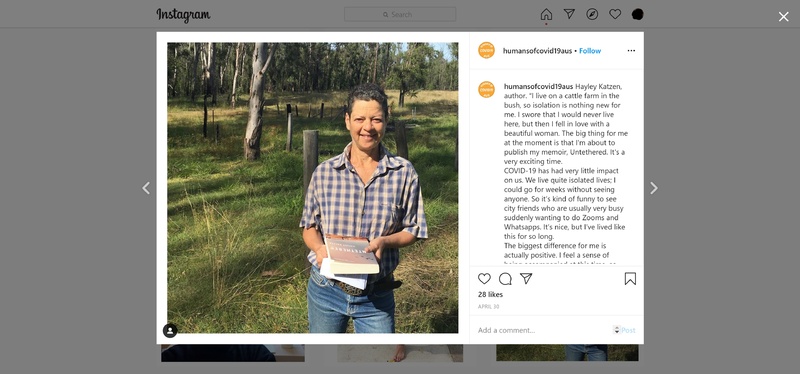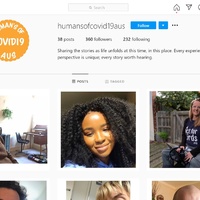Item
Humans of Covid-19 AU: Hayley Katzen
Title (Dublin Core)
Humans of Covid-19 AU: Hayley Katzen
Description (Dublin Core)
“I live on a cattle farm in the bush, so isolation is nothing new for me. I swore that I would never live here, but then I fell in love with a beautiful woman. The big thing for me at the moment is that I'm about to publish my memoir, Untethered. It's a very exciting time.
COVID-19 has had very little impact on us. We live quite isolated lives; I could go for weeks without seeing anyone. So it’s kind of funny to see city friends who are usually very busy suddenly wanting to do Zooms and Whatsapps. It’s nice, but I’ve lived like this for so long.
The biggest difference for me is actually positive. I feel a sense of being accompanied at this time, as everyone is now living as I have been living. Often, over the years, I have felt quite lonely and struggled with the isolation, as do so many people. Now we are all in this. Adjusting to isolation is a deeply personal process. We all need to find what delights us and add it to our days.
As I have compromised immunity, I have to wear a mask when going out. It feels very strange going to the supermarket and not being able to connect with anyone. I’ve been dealing with ovarian cancer treatment, so there is an uncertainty to my future. At this time, when the whole world is dealing with anxiety and uncertainty, there’s a universality to this shared experience. I find this intriguing at one level, and also feel incredibly lucky to be where I am.
What most interests me is what we will put back into the world after this. My life won't change significantly. But in terms of our fragile planet, what will people do to take care of it?”
Instagram post on Hayley Katzen, author, and their experience during the pandemic, which was created by a psychology student living in Melbourne who was interested to hear about how COVID-19 was impacting on different peoples’ lives.
COVID-19 has had very little impact on us. We live quite isolated lives; I could go for weeks without seeing anyone. So it’s kind of funny to see city friends who are usually very busy suddenly wanting to do Zooms and Whatsapps. It’s nice, but I’ve lived like this for so long.
The biggest difference for me is actually positive. I feel a sense of being accompanied at this time, as everyone is now living as I have been living. Often, over the years, I have felt quite lonely and struggled with the isolation, as do so many people. Now we are all in this. Adjusting to isolation is a deeply personal process. We all need to find what delights us and add it to our days.
As I have compromised immunity, I have to wear a mask when going out. It feels very strange going to the supermarket and not being able to connect with anyone. I’ve been dealing with ovarian cancer treatment, so there is an uncertainty to my future. At this time, when the whole world is dealing with anxiety and uncertainty, there’s a universality to this shared experience. I find this intriguing at one level, and also feel incredibly lucky to be where I am.
What most interests me is what we will put back into the world after this. My life won't change significantly. But in terms of our fragile planet, what will people do to take care of it?”
Instagram post on Hayley Katzen, author, and their experience during the pandemic, which was created by a psychology student living in Melbourne who was interested to hear about how COVID-19 was impacting on different peoples’ lives.
Date (Dublin Core)
April 30, 2020
Creator (Dublin Core)
Amira Moshinsky
Contributor (Dublin Core)
Jen Rodriguez
Type (Dublin Core)
Instagram post
Link (Bibliographic Ontology)
Controlled Vocabulary (Dublin Core)
English
Biography
English
Social Distance
English
Emotion
Curator's Tags (Omeka Classic)
personal experience
isolation
Australia
memoir
Linked Data (Dublin Core)
Date Submitted (Dublin Core)
06/03/2020
Date Modified (Dublin Core)
06/22/2020
06/27/2020
Date Created (Dublin Core)
04/30/2020
This item was submitted on June 22, 2020 by Jen Rodriguez using the form “Share Your Story” on the site “A Journal of the Plague Year”: http://mail.covid-19archive.org/s/archive
Click here to view the collected data.New Tags





















